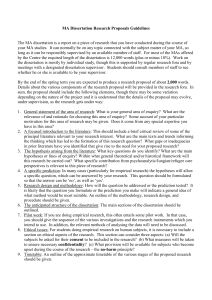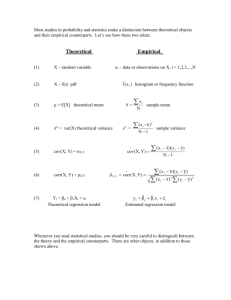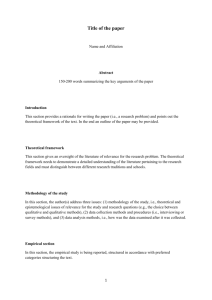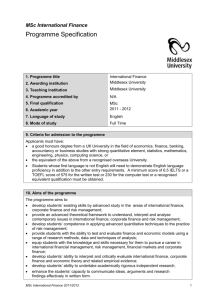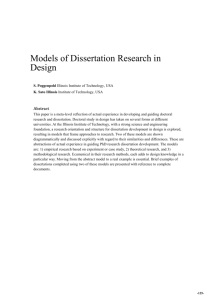Philosophy of Natural Sciences
advertisement
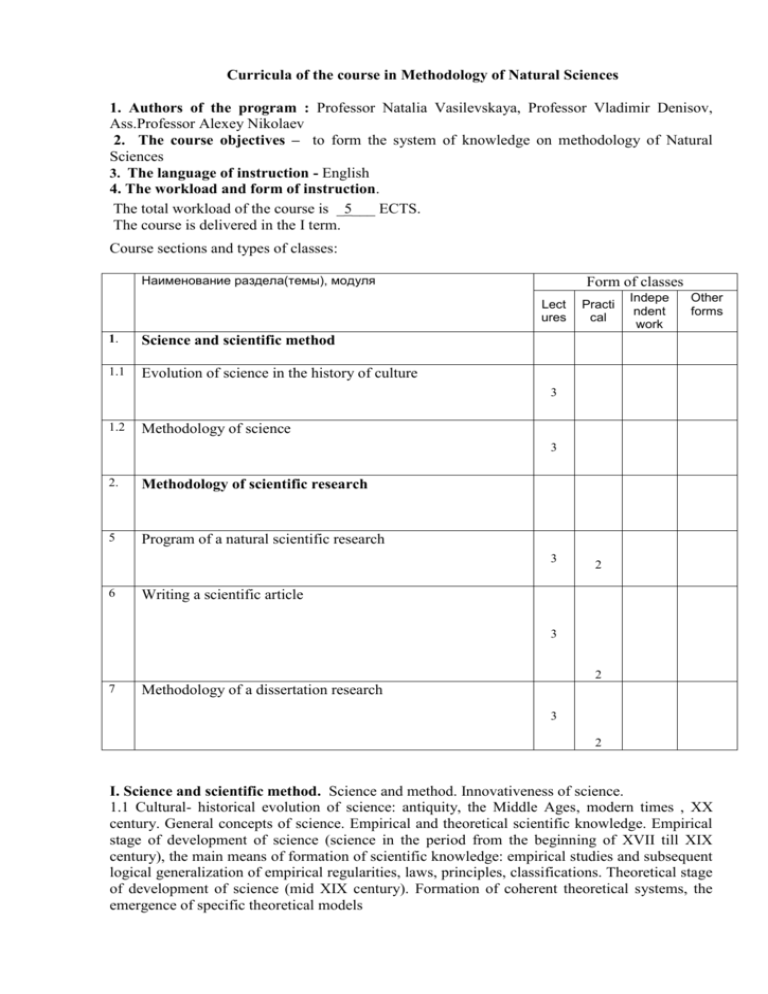
Curricula of the course in Methodology of Natural Sciences 1. Authors of the program : Professor Natalia Vasilevskaya, Professor Vladimir Denisov, Ass.Professor Alexey Nikolaev 2. The course objectives – to form the system of knowledge on methodology of Natural Sciences 3. The language of instruction - English 4. The workload and form of instruction. The total workload of the course is _5___ ECTS. The course is delivered in the I term. Course sections and types of classes: Наименование раздела(темы), модуля Form of classes Lect ures 1. Science and scientific method 1.1 Evolution of science in the history of culture Practi cal Indepe ndent work Other forms 3 1.2 Methodology of science 3 2. Methodology of scientific research 5 Program of a natural scientific research 3 6 2 Writing a scientific article 3 2 7 Methodology of a dissertation research 3 2 I. Science and scientific method. Science and method. Innovativeness of science. 1.1 Cultural- historical evolution of science: antiquity, the Middle Ages, modern times , XX century. General concepts of science. Empirical and theoretical scientific knowledge. Empirical stage of development of science (science in the period from the beginning of XVII till XIX century), the main means of formation of scientific knowledge: empirical studies and subsequent logical generalization of empirical regularities, laws, principles, classifications. Theoretical stage of development of science (mid XIX century). Formation of coherent theoretical systems, the emergence of specific theoretical models Science and its role in modern society. Levels, forms and methods of scientific cognition. Interaction of theoretical and empirical levels of development of science. The notion of the scientific worldview (SWV), its development in the evolution of culture. Features of the transition from classical to nonclassical and postnonclassical SWV. Types of scientific rationality. The concept of scientific prediction and forecasting functions of science. Scientific hypothesis, verification principles ( L.Vitgenshteyn ) and falsification ( K. Popper ). Natural, social and human sciences: approaches to classification of sciences. Features of modern natural sciences. 1.2. Methodology of work Concept of the method and methodology of science. Methodology as the study of the organization of activities. The content and structure of the methodology. General methodology of science, methodology of the individual sciences, methodology of private sections of each of the sciences. The evolution of research methodology in the history of science. Methodological problems of modern science in the field of ecology, evolutionary theory, systematics of organisms, molecular biology and genetics. Concept of scientific schools. Scheme of the methodology of scientific research: 1. Characteristics of scientific activity: Features, principles, conditions, rules of scientific activity. 2. The logical structure of scientific activity: subject, object, forms, means, methods, results of scientific activity. 3. Temporal structure of scientific activity: phase, stage, stages of scientific activity. 2. Methodology of scientific research 2.1. Program of natural scientific research. Classification of scientific research. Program of scientific research, general requirements, the choice of topics and issues. Levels and structure of scientific research methodology. Subject and object of natural science research. Communication with research funds, the rules of research grant applications. Documentary sources, field research, data collection, data bank in the study. Major national works on methodology and research methods. Purpose, objectives. Qualitative and quantitative methods in applied research. Methods of biological and ecological research, data processing and analysis of results. Definition and classification of samples. Data processing rules. Interpretation of the data. 2.2. Preparation and publication of a scientific article Определение темы, подбор источников, группировка авторов. Анализ и обобщение литературы по теме. Научная этика диалога. Композиция и вспомогательный научный аппарат публикации. Академизм изложения. Заглавие, тезариус понятий. Цитирование, ссылки и сноски. Definition of the subject, sourcing, grouping authors. Analysis and synthesis of the literature on the topic. Scientific ethics of dialogue. Composition and supportive scholarly apparatus of the publication. Academism of presentation. Title, thesaurus of concepts. Citation, references and footnotes. 2.3. Methodology of dissertation research Methodology of scientific work and preparation of the dissertation. Scientific analysis and research synthesis as the main form of scientific work. The structure and logic of scientific dissertation research. Choosing a theme, work plan, bibliographic search, selection of literature and factual material. Analysis of a problem, focus on novelty, dialogue with the authors. Scientific novelty and practical significance. Architecture of dissertation. Categorical apparatus, concepts, terms, definitions, theories, notions, and their relationship. The distribution and structure of the material. Disclosure of problems, the interpretation of data, synthesis of the main results. Rules and scientific ethics of citation: scientific schools, directions, personalities. Academic style and language features of the dissertation. Master's thesis: the basic requirements for content and design. Execution, compliance with national standards, the procedure of public defence.


